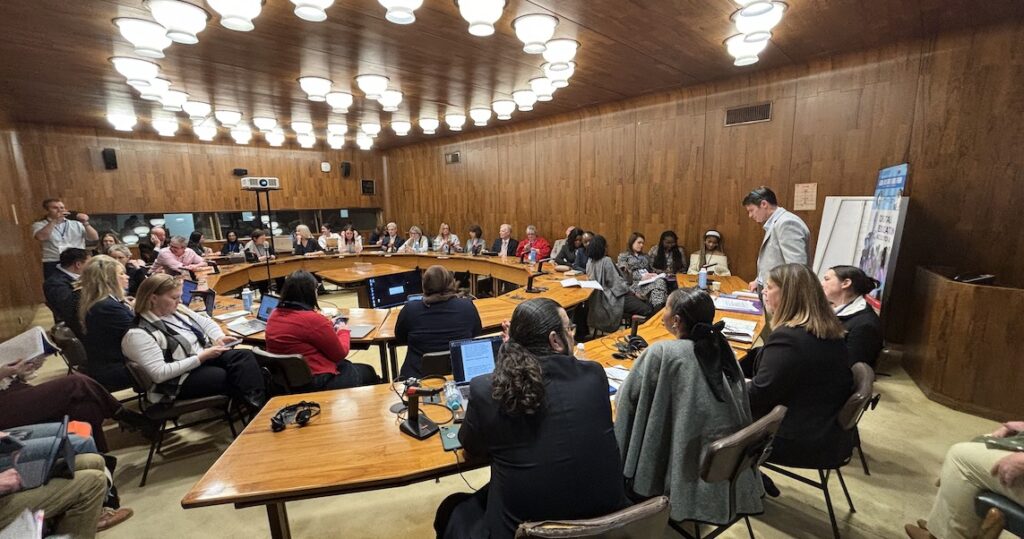Call for Papers
Almaty, Kazakhstan - October 15-17 2025
United Nations, New York - March 2026
DEADLINE FOR PAPERS IS THURSDAY JUNE 26 2025
Advance Global Inclusion Through Your Voice, Research, and Practice
The World Inclusion Congress (WIC) 2025 invites educators, academics, students, policymakers, NGO leaders, and leaders in creative, cultural, sporting and corporate sectors from around the world to submit proposals to speak at one of the most important gatherings in global inclusive education.
This is not just a conference. It’s a movement — toward equity, access, and dignity for every learner, everywhere.
Join 5,000+ participants from over 100 countries to present your ideas, share your practice, and help shape the UN White Paper on Implementing Inclusion Across Society, to be launched at the United Nations in 2026.
Conference Tracks
Each proposal must be linked to one main track. Tracks help us organise the programme and ensure a wide range of perspectives.
You can choose from:
- Global School Leadership
- Social, Emotional & Mental Health (SEMH)
- Digital Wellbeing
- Education Technology (EdTech)
- Artificial Intelligence in Education
- Early Years & Early Childhood
- Academic Research
- Assistive Technology
- Inclusive Pedagogy
- Alternative Pathways & Non-traditional Models
- Specialist Practitioners
- Government & Policy
- NGO & Civil Society
- Arts & Culture
- Sport
- Corporate & EdTech Partners
- Youth & Student Voice
Conference Themes
The themes below cut across all tracks. Your proposal should touch on at least one of these, but feel free to combine themes or add your own perspective.
- Identifying Barriers, Concerns & Challenges
- Celebrating Progress: Best Practices & Innovations
- Cultivating Inclusive Cultures
- Meeting Diverse Learning Needs
- Empowering Learner Agency
- Transforming Pedagogical Practices
- Upskilling Teachers for Inclusion
- Harnessing Technology for Inclusion
- Ensuring Equitable Access & Opportunities
- Shifting Perceptions & Attitudes
- Strengthening Family & Community Partnerships
- Developing Inclusive Leadership at All Levels
- Building Sustainable & Scalable Systems
- Measuring Inclusive Impact
- Addressing Intersectionality in Education

Submission Categories
You can submit your proposal in any of the following formats:
- Workshop (interactive, 60–90 minutes)
- Individual Paper Presentation (15–20 minutes)
- Panel Contribution (submit alone or with co-presenters)
- Poster Presentation (visual research or project showcase)
- Other (be creative – films, installations, performances are welcome too!)
Suggested Session Titles
To help inspire your proposal, please see here for some some suggested session titles from each track-theme combination.You are welcome to:
- Choose one of these titles
- Adapt one for your context
- Propose something entirely new
Application Process
- Read the Tracks and Themes
- Choose your submission category
- Complete the online application:
- Title
- Abstract (250 words)
- Track + Theme
- Bio (150 words)
- Accessibility needs (if any)
- Professional verification
- Submit by Thursday June 26, 2025

Ready to submit? Please click below for the Application Form.
Frequently Asked Questions
Can I submit more than one proposal?
Yes — you may submit up to two proposals, in different categories if desired.
Do I need to be an academic to apply?
No. We welcome classroom teachers, youth, NGOs, therapists, artists, EdTech leaders — anyone with relevant expertise or lived experience.
Is there a fee to submit or attend?
There is no fee to submit. Selected speakers are responsible for their own travel and accommodation unless otherwise arranged.
Can I attend virtually?
This year’s event is in-person only. However, selected sessions will be recorded and featured globally after the event.
Is my session peer-reviewed?
Yes. Submissions are reviewed by an international panel using clear, transparent criteria.
Will my name be published?
Only with your consent. You can opt into or out of publication when submitting.
Key Dates at a Glance
Call for Papers Opens May 5, 2025
Call for Papers Closes June 26, 2025
Review Period June-July 2025
Acceptances Notified July 15, 2025
Speaker Materials Due September 1, 2025
Conference October 15–17, 2025
UN White Paper Launch March 2026
Join the Global Conversation
Be part of a community redefining society — not just in theory, but in policies, lives and the real world. Submit your proposal and help build a more inclusive future for every learner.
Sample Session Topics by Track
School Leadership:
“We Tried Everything”: Leading Through Real Barriers • Making Inclusion the Culture, Not the Exception • Building Schools Around Learners, Not Labels • What Happens When Students Lead Us? • Headteachers as Inclusion Architects
SEMH (Social, Emotional, Mental Health):
The Behaviour Wasn’t the Problem: What We Learned About Trauma • Creating a Culture Where Staff and Students Can Breathe • Small Steps, Deep Healing: Personalising SEMH Support • Resilience Isn’t Just a Buzzword: Building It in Real Time • Unpacking the Quiet Crisis: Ending the Shame Around SEMH
Digital Wellbeing:
Children, Screens, and Sanity: Finding Balance in a Wired World • What Does Digital Belonging Look Like? • Designing Online Spaces That Feel Safe • Digital Boundaries: Teaching Children to Navigate Online Life • When Tech Drains Us: Tools for Protecting Mental Health
EdTech:
Technology That Includes: How to Make It Work for Everyone • When EdTech Heals: Real Stories from Real Classrooms • Designing Tools for Every Learner, Not Just the “Average” One • Giving Students the Wheel: EdTech That Empowers • How to Buy Tech Without Leaving Learners Behind
AI in Education:
Who’s Missing in the Data? Bias and Belonging in AI • How We Taught the Algorithm to See Our Students • Can AI Personalise Without Excluding? • Listening Machines: Can AI Really Hear What Matters? • Ethical AI in the Classroom: A Principal’s Dilemma
Early Years:
Inclusion Starts in the Sandpit: Why Early Years Matter Most • Tiny Hands, Big Messages: What Inclusion Looks Like in Preschool • Creating Spaces of Belonging for the Very Young • When Toddlers Teach Us About Difference • Play as a Pathway to Inclusion
Academic Research:
What We Still Don’t Know About Inclusion (But Should) • Bridging Theory and Practice: Stories from the Field • Whose Evidence Counts? Rethinking Rigor in Inclusive Research • Researching With (Not Just On) Communities • Making Intersectionality Visible in Education Studies
Assistive Technology:
Tech That Doesn’t Just Work — It Understands • Tools That Empower, Not Stigmatise • Assistive Doesn’t Mean Extra: Rethinking Integration • Co-Designing Tools With Those Who Use Them • Breaking the “Special Equipment” Stereotype
Alternative Pathways:
What Happens When We Let Students Choose the Path? • Educating Beyond the Mainstream: Stories of Success • Reaching Those Who’ve Opted Out (Or Been Pushed Out) • Reimagining Success for Non-Traditional Learners • Pathways That Actually Fit Real Lives
Inclusive Pedagogy:
Teaching Strategies That Don’t Leave Anyone Behind • What Inclusion Looks Like in Everyday Lessons • From Theory to Practice: Embedding UDL in Real Classrooms • Letting Students’ Voices Shape the Curriculum • Co-Teaching, Co-Learning: Pedagogies That Work
Specialist Practitioners:
From Labels to Learners: What We’re Doing Differently Now • Working Side-by-Side with Teachers, Not Above Them • Specialist Voices in the Staffroom: What Needs to Change • Reframing “Support”: Strengths-Based Practice • Inclusion Without Isolation: Our Role in the Classroom
Government & Policy:
From Strategy to School Gates: Making Policy Real • Where Policy Misses the Margins (and What We Can Do) • Designing Inclusion into National Curriculum Reforms • Giving Teachers Time: The Missing Piece in Policy • Scaling What Works Without Diluting It
NGO & Civil Society:
When Change Starts with the Community • Making Inclusion Work in Low-Resource Settings • Parent Groups, Local Leaders, and the Power of Proximity • How Civil Society Keeps Systems Accountable • Creating Belonging from the Bottom Up
Corporate & EdTech Partners:
Inclusion Is Good Business: Why It Matters Now • Designing Products With Empathy, Not Just Efficiency • What We Learned Co-Designing with Disabled Learners • Supporting Teachers, Not Selling to Them • The Metrics That Matter: Impact Beyond Profit
Youth & Student Voice:
What We Wish You’d Asked Us • When Students Take the Mic: Real Stories, Real Change • Young People Designing the Schools They Want • From Tokenism to Real Power: Student Voice That Shifts Culture • “We’re Not Future Leaders — We’re Leading Now”
